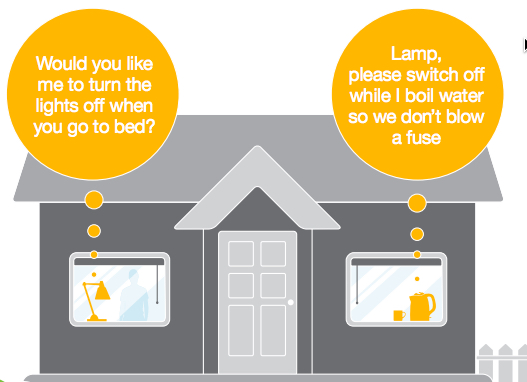AI will replace smartphones within 5 years, Ericsson survey suggests
December 9, 2015

(credit: Ericsson ConsumerLab)
Artificial intelligence (AI) interfaces will take over, replacing smartphones in five years, according to a survey of more than 5000 smartphone customers in nine countries by Ericsson ConsumerLab in the fifth edition of its annual trend report, 10 Hot Consumer Trends 2016 (and beyond).
Smartphone users believe AI will take over many common activities, such as searching the net, getting travel guidance, and as personal assistants. The survey found that 44 percent think an AI system would be as good as a teacher and one third would like an AI interface to keep them company. A third would rather trust the fidelity of an AI interface than a human for sensitive matters; and 29 percent agree they would feel more comfortable discussing their medical condition with an AI system.
However, many of the users surveyed find smartphones limited.
Impractical. Constantly having a screen in the palm of your hand is not always a practical solution, such as in driving or cooking.
Battery capacity limits. One in 3 smartphone users want a 7−8 inch screen, creating a battery drain vs. size and weight issue.
Not wearable. 85 percent of the smartphone users think intelligent wearable electronic assistants will be commonplace within 5 years, reducing the need to always touch a screen. And one in two users believes they will be able to talk directly to household appliances.
VR and 3D better. The smartphone users want movies that play virtually around the viewer, virtual tech support, and VR headsets for sports, and more than 50 percent of consumers think holographic screens will be mainstream within 5 years — capabilities not available in a small handheld device. Half of the smartphone users want a 3D avatar to try on clothes online, and 64 percent would like the ability to see an item’s actual size and form when shopping online. Half of the users want to bypass shopping altogether, with a 3D printer for printing household objects such as spoons, toys and spare parts for appliances; 44 percent even want to print their own food or nutritional supplements.
The 10 hot trends for 2016 and beyond cited in the report
-
The Lifestyle Network Effect. Four out of five people now experience an effect where the benefits gained from online services increases as more people use them. Globally, one in three consumers already participates in various forms of the sharing economy.
-
Streaming Natives. Teenagers watch more YouTube video content daily than other age groups. Forty-six percent of 16-19 year-olds spend an hour or more on YouTube every day.
-
AI Ends The Screen Age. Artificial intelligence will enable interaction with objects without the need for a smartphone screen. One in two smartphone users think smartphones will be a thing of the past within the next five years.
-
Virtual Gets Real. Consumers want virtual technology for everyday activities such as watching sports and making video calls. Forty-four percent even want to print their own food.
-
Sensing Homes. Fifty-five percent of smartphone owners believe bricks used to build homes could include sensors that monitor mold, leakage and electricity issues within the next five years. As a result, the concept of smart homes may need to be rethought from the ground up.
-
Smart Commuters. Commuters want to use their time meaningfully and not feel like passive objects in transit. Eighty-six percent would use personalized commuting services if they were available.
-
Emergency Chat. Social networks may become the preferred way to contact emergency services. Six out of 10 consumers are also interested in a disaster information app.
-
Internables. Internal sensors that measure well-being in our bodies may become the new wearables. Eight out of 10 consumers would like to use technology to enhance sensory perceptions and cognitive abilities such as vision, memory and hearing.
-
Everything Gets Hacked. Most smartphone users believe hacking and viruses will continue to be an issue. As a positive side-effect, one in five say they have greater trust in an organization that was hacked but then solved the problem.
-
Netizen Journalists. Consumers share more information than ever and believe it increases their influence on society. More than a third believe blowing the whistle on a corrupt company online has greater impact than going to the police.
Source: 10 Hot Consumer Trends 2016. Ericsson ConsumerLab, Information Sharing, 2015. Base: 5,025 iOS/Android smartphone users aged 15-69 in Berlin, Chicago, Johannesburg, London, Mexico City, Moscow, New York, São Paulo, Sydney and Tokyo